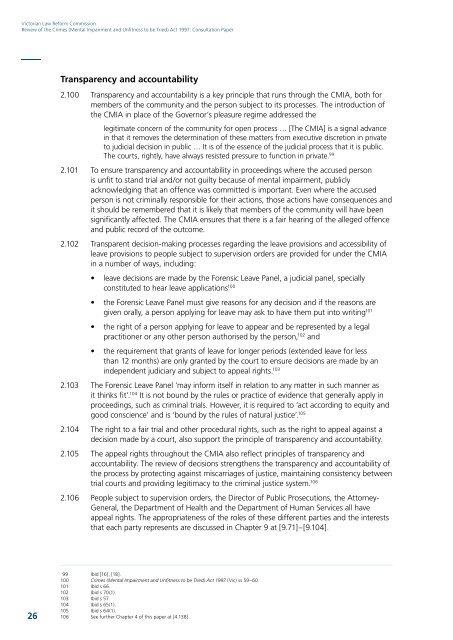Crimes Mental Impairment consultation paper.pdf - Victorian Law ...
Crimes Mental Impairment consultation paper.pdf - Victorian Law ...
Crimes Mental Impairment consultation paper.pdf - Victorian Law ...
Create successful ePaper yourself
Turn your PDF publications into a flip-book with our unique Google optimized e-Paper software.
<strong>Victorian</strong> <strong>Law</strong> Reform Commission<br />
Review of the <strong>Crimes</strong> (<strong>Mental</strong> <strong>Impairment</strong> and Unfitness to be Tried) Act 1997: Consultation Paper<br />
Transparency and accountability<br />
2.100 Transparency and accountability is a key principle that runs through the CMIA, both for<br />
members of the community and the person subject to its processes. The introduction of<br />
the CMIA in place of the Governor’s pleasure regime addressed the<br />
legitimate concern of the community for open process … [The CMIA] is a signal advance<br />
in that it removes the determination of these matters from executive discretion in private<br />
to judicial decision in public … It is of the essence of the judicial process that it is public.<br />
The courts, rightly, have always resisted pressure to function in private. 99<br />
2.101 To ensure transparency and accountability in proceedings where the accused person<br />
is unfit to stand trial and/or not guilty because of mental impairment, publicly<br />
acknowledging that an offence was committed is important. Even where the accused<br />
person is not criminally responsible for their actions, those actions have consequences and<br />
it should be remembered that it is likely that members of the community will have been<br />
significantly affected. The CMIA ensures that there is a fair hearing of the alleged offence<br />
and public record of the outcome.<br />
2.102 Transparent decision-making processes regarding the leave provisions and accessibility of<br />
leave provisions to people subject to supervision orders are provided for under the CMIA<br />
in a number of ways, including:<br />
• leave decisions are made by the Forensic Leave Panel, a judicial panel, specially<br />
constituted to hear leave applications 100<br />
• the Forensic Leave Panel must give reasons for any decision and if the reasons are<br />
given orally, a person applying for leave may ask to have them put into writing 101<br />
• the right of a person applying for leave to appear and be represented by a legal<br />
practitioner or any other person authorised by the person, 102 and<br />
• the requirement that grants of leave for longer periods (extended leave for less<br />
than 12 months) are only granted by the court to ensure decisions are made by an<br />
independent judiciary and subject to appeal rights. 103<br />
2.103 The Forensic Leave Panel ‘may inform itself in relation to any matter in such manner as<br />
it thinks fit’. 104 It is not bound by the rules or practice of evidence that generally apply in<br />
proceedings, such as criminal trials. However, it is required to ‘act according to equity and<br />
good conscience’ and is ‘bound by the rules of natural justice’. 105<br />
2.104 The right to a fair trial and other procedural rights, such as the right to appeal against a<br />
decision made by a court, also support the principle of transparency and accountability.<br />
2.105 The appeal rights throughout the CMIA also reflect principles of transparency and<br />
accountability. The review of decisions strengthens the transparency and accountability of<br />
the process by protecting against miscarriages of justice, maintaining consistency between<br />
trial courts and providing legitimacy to the criminal justice system. 106<br />
2.106 People subject to supervision orders, the Director of Public Prosecutions, the Attorney-<br />
General, the Department of Health and the Department of Human Services all have<br />
appeal rights. The appropriateness of the roles of these different parties and the interests<br />
that each party represents are discussed in Chapter 9 at [9.71]–[9.104].<br />
26<br />
99 Ibid [16], [18].<br />
100 <strong>Crimes</strong> (<strong>Mental</strong> <strong>Impairment</strong> and Unfitness to be Tried) Act 1997 (Vic) ss 59–60.<br />
101 Ibid s 66.<br />
102 Ibid s 70(1).<br />
103 Ibid s 57.<br />
104 Ibid s 65(1).<br />
105 Ibid s 64(1).<br />
106 See further Chapter 4 of this <strong>paper</strong> at [4.138].

















